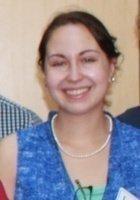Connect with hundreds of tutors like Devon
Who needs tutoring?
FEATURED BY
TUTORS FROM
- YaleUniversity
- PrincetonUniversity
- StanfordUniversity
- CornellUniversity

Devon
About Me
I believe that learning, like the rest of life, is meant to be savored. I personally do not enjoy learning information that I find boring, so I've made it my life goal to find a way to make everything interesting. My goal as an educator and as a human being is to find the wonder and humor in everything that I learn and teach. I would love to share this experience with you. I've spent over ten years educating informally as well as professionally in environments which range from K-12 classrooms and higher education to the zoo. I graduated with accolades from Florida State University with a degree in Biology, focused in Zoology, and am currently working on an MS in Biological Sciences at Texas A&M University Commerce. I love learning, and I think that together, we can make sure that you do, too! Outside of school I have tutored adult ESL students and worked as an editor in a writing center. Professionally, I worked for three years as an educator and keeper at the Fort Worth Zoo, bringing animals into classrooms and providing programming about them to the public. After working briefly as a science educator in Dallas, I began tutoring for Varsity tutors in subjects ranging from K-16 life sciences, mathematics, and ACT prep. For the past four years, I have worked as a program coordinator and educator, building hands-on STEM outreach programs and college-preparatory/remedial mathematics programs through federal grant projects in Dallas. I have personally reached over 10,000 students in the four years of my work with hands-on STEM programming, but my proudest accomplishments have been the bonds I've built with students who swear I've "converted" them to a life of STEM through our work together. As your tutor, I'd like to get to know you, your learning style and how we can work as a team to help you to reach your academic goals. I believe that the first step to success is the power of knowledge and there is no concept too complex or dry to be digested by any person. The key to learning is all in the presentation! When I am not teaching, I like to train animals, have adventures, run trails, and write short stories. My vices include baked chips and sour punch straws. I can make a mean lasagna and my mother thinks that I am very funny. Let's get together, talk about how we can help you to achieve your academic goals and enjoy the journey as well!
Education & Certifications
Q&A with Devon
Tutoring Subjects
Connect with a tutor like Devon
Connect with a tutor like Devon
Tutors with Similar Experience

Joanna
10+ YearsLaGrange College
Bachelor in Arts, English/Theater Performance Double Major
View Profile
